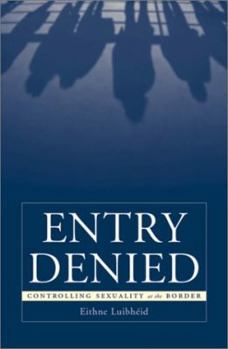Entry Denied: Controlling Sexuality at the Border
Select Format
Select Condition 
Book Overview
A revelatory examination of 150 years of sexuality-based discrimination against immigrants to the United States.
Lesbians, prostitutes, women likely to have sex across racial lines, "brought to the United States for immoral purposes," or "arriving in a state of pregnancy"--national threats, one and all. Since the late nineteenth century, immigrant women's sexuality has been viewed as a threat to national security, to be contained through strict border-monitoring practices. By scrutinizing this policy, its origins, and its application, Eithne Luibh id shows how the U.S. border became a site not just for controlling female sexuality but also for contesting, constructing, and renegotiating sexual identity.
Initially targeting Chinese women, immigration control based on sexuality rapidly expanded to encompass every woman who sought entry to the United States. The particular cases Luibh id examines-efforts to differentiate Chinese prostitutes from wives, the 1920s exclusion of Japanese wives to reduce the Japanese-American birthrate, the deportation of a Mexican woman on charges of lesbianism, the role of rape in mediating women's border crossings today--challenge conventional accounts that attribute exclusion solely to prejudice or lack of information. This innovative work clearly links sexuality-based immigration exclusion to a dominant nationalism premised on sexual, gender, racial, and class hierarchies.Format:Paperback
Language:English
ISBN:0816638047
ISBN13:9780816638048
Release Date:June 2015
Publisher:University of Minnesota Press
Length:288 Pages
Weight:0.90 lbs.
Dimensions:0.6" x 5.9" x 9.0"
Customer Reviews
1 rating
Excelente libro para conocer sobre las leyes de imigracion y su impacto
Published by Thriftbooks.com User , 17 years ago
No he terminado de leer el libro completo. Pero hasta donde he leido, es un excelente libro para aprender mas sobre las leyes de inmigracion en los Estados Unidos y su impacto hacia los immigrantes. Me encanta como explica que los problemas de la nacion se reflejan en la frontera que a su vez lo refleja en el cuerpo de la mujer. Otra cosa que me gusta es como concta la relacion entre sexualidad, genero, raza y etnia.






